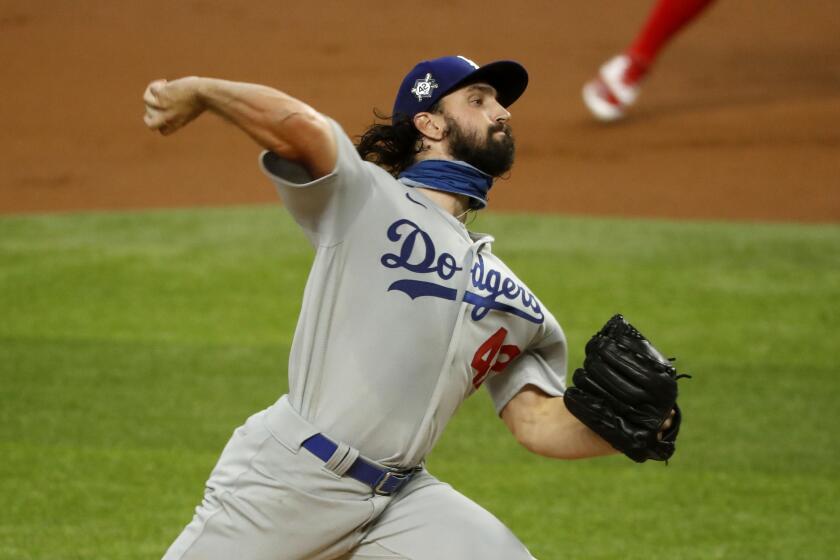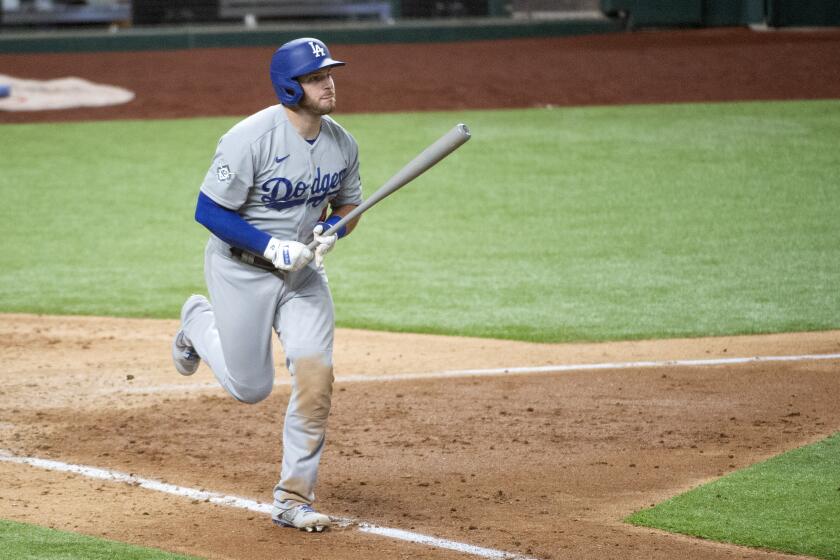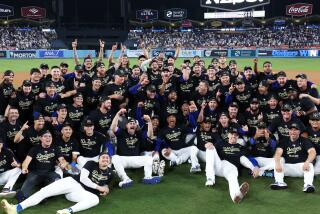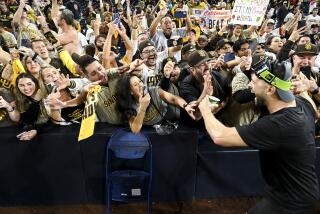Will flurry of trades be enough for Padres to beat Dodgers to a World Series title?
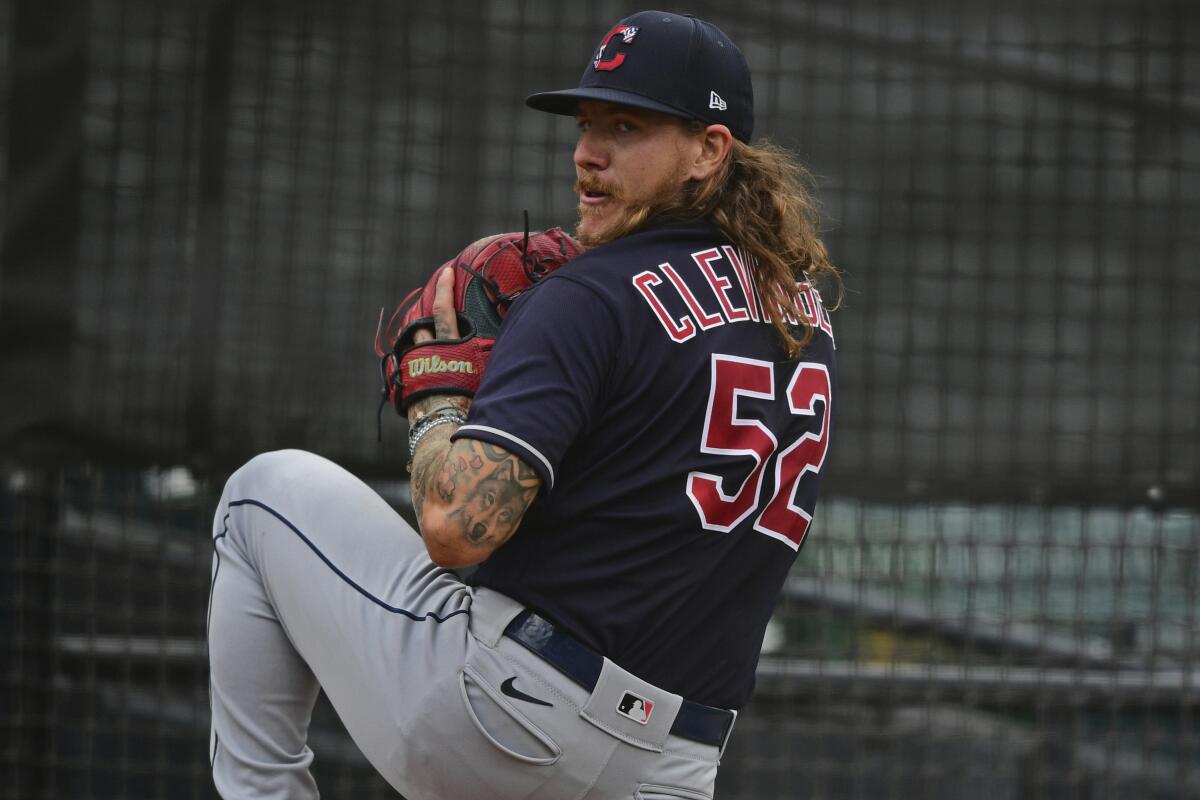
On a lovely spring morning five years ago, Dave Roberts was excited. Roberts was a coach for the San Diego Padres then, and his hometown team had spent the winter loading up on talent. The Padres had imported Matt Kemp, Justin Upton, Wil Myers, James Shields and Craig Kimbrel.
“We’re the talk of the town,” Roberts said then.
Kemp lauded general manager A.J. Preller as a “rock star.” The nickname stuck, but the optimism did not. As it turned out, a few stars could not cover up all the blemishes on an 85-loss team.
Preller blew up that team and fired its manager. The Padres went into tank mode, and the Dodgers hired Roberts as their manager. Since then, the Padres have given the Dodgers nothing to worry about — until Monday, that is, when Preller transformed the Padres into the most formidable hurdle between the Dodgers and the World Series.
For the first time in five years, the Padres are the talk of the town. For the first time in 14 years, they could make the playoffs.
Tony Gonsolin’s split-finger changeup has turned him into a success story suddenly vying for a crucial role in the Dodgers’ postseason plans.
Their timing is exquisite. For one, the National League appears terrible. On Monday, four of the 15 teams had winning records: the Dodgers, Chicago Cubs, Atlanta Braves and the Padres.
In this pandemic year, eight teams in each league make the playoffs, with each team playing a best-of-three series in the first round.
In a normal year, if the Dodgers won the division, they would advance to the division series, and the Padres would aim for a one-game wild-card playoff. In that scenario, teams often are reluctant to embark on such a shopping spree.
Preller said the Padres likely would have made the same moves no matter what the playoff format. After all, owner Ron Fowler had said last year: “If we don’t win in 2020, heads will roll.”
The Padres’ acquisition of star pitcher Mike Clevinger on Monday highlighted a 48-hour whirlwind in which Preller made six trades, with 10 players inbound and 16 players outbound. The new Padres included a designated hitter, two catchers and four relievers.
“They’re trying to win,” Clevinger said on a videoconference. “In anybody’s eyes, that’s a very promising thing, not just for the Padres but for the game of baseball itself. That’s something I think the game needs: more teams out there pushing to win.”
Nothing is guaranteed, of course. In 2012, the Dodgers made five trades for nine players within a month. They played barely above .500 the rest of the way — in part, they said, because the clubhouse chemistry took time to develop. That could be an issue in San Diego, particularly in introducing two new catchers to the pitching staff.
But talent plays above all, and the Padres have it, most notably in shortstop Fernando Tatis Jr., arguably the best player in the NL so far this year, and third baseman Manny Machado. The Padres lead the league in runs and OPS; they trail only the Dodgers in home runs and run differential.
“I think, before the trades, it was a World Series-caliber roster. ... This is a team [that is going] to make a serious, serious run,” Clevinger said.
“I don’t think there are going to be many teams that can get in the way of what we’ve got right now.”
This isn’t 2015, when Preller was trying to make a bad team into a good one. In 2020, he is trying to make a good team into a great one.
The Dodgers got to possible trade target Lance Lynn in defeating the Rangers 7-4 and picking up their 25th win two days before the MLB trade deadline.
And he has done it by going against conventional wisdom, which values home-grown players above all. If Clevinger starts Game 1 of the playoffs, the Padres could feature a lineup in which none of the 10 players would be home grown: Machado and first baseman Eric Hosmer were signed as free agents, the rest acquired in trade.
That would seem to indicate Preller had blown up his farm system to go all in on 2020, but no. The Padres poured money into Latin American amateurs in the last year before Major League Baseball capped international spending, developing a prospect base so deep that Preller could complete his trade blitz while still retaining his top three prospects, most notably pitcher Mackenzie Gore.
Their nemesis also is their role model: a Dodgers team that has won the division seven consecutive years, sustaining success with a steady infusion of affordable minor league talent.
Said Preller: “We targeted this 2020 season a few years ago as the year we wanted to hopefully start a run of years where every single season we can be competitive, and a team that we expect to play deep into October.”
The Padres still have eight of their top 10 prospects, according to Baseball America, and six of the top 100 in the major leagues.
“Knowing that this organization has a chance to win — not just this year, but for the next five, six, seven years — you’ve got to be excited for it,” Clevinger said.
If the Padres blossom in October, they could beat L.A. and still have something left to play for.
“We’re aiming for the big cake,” Tatis told reporters on the eve of the Padres’ 2020 opener. “Why not? Let’s go win a World Series.”
“Knowing that this organization has a chance to win — not just this year, but for the next five, six, seven years — you’ve got to be excited for it.”
More to Read
Go beyond the scoreboard
Get the latest on L.A.'s teams in the daily Sports Report newsletter.
You may occasionally receive promotional content from the Los Angeles Times.

